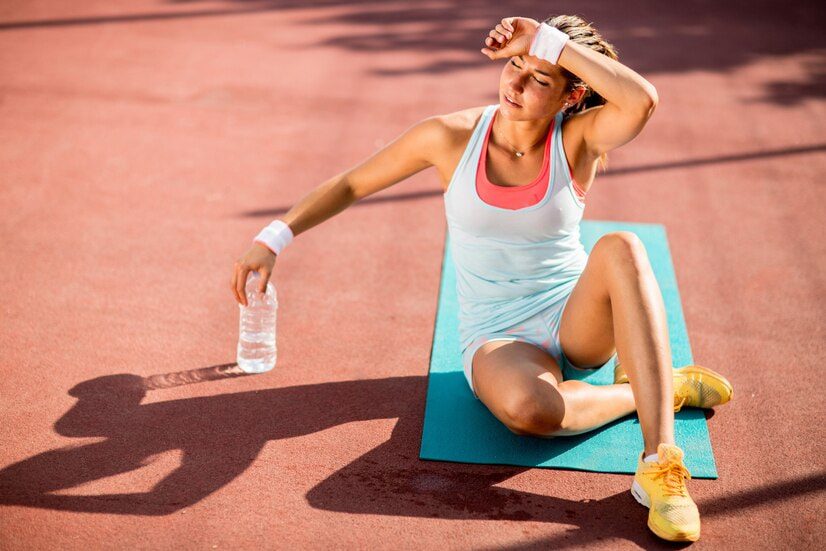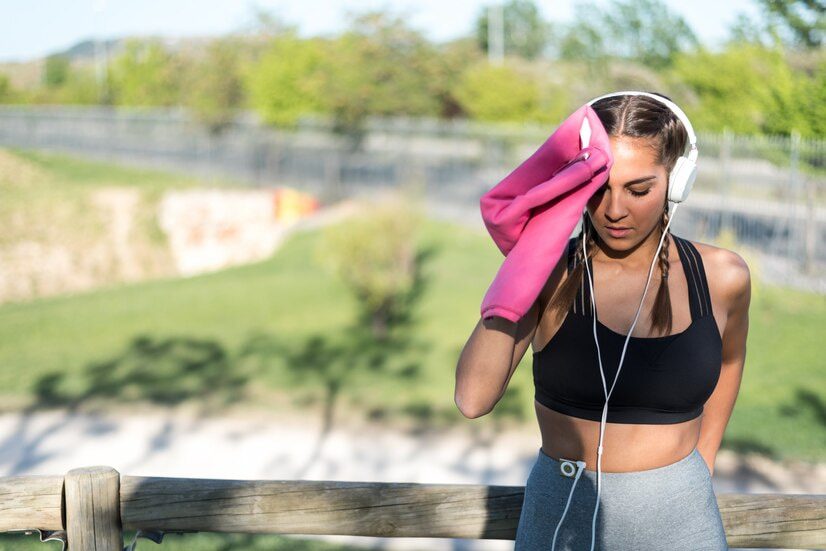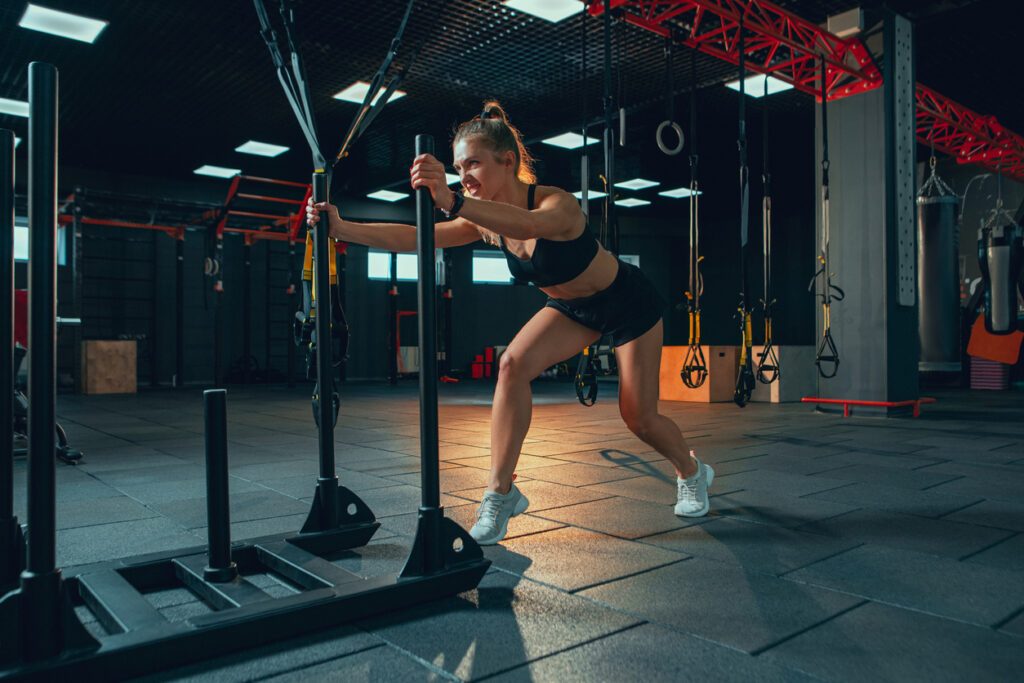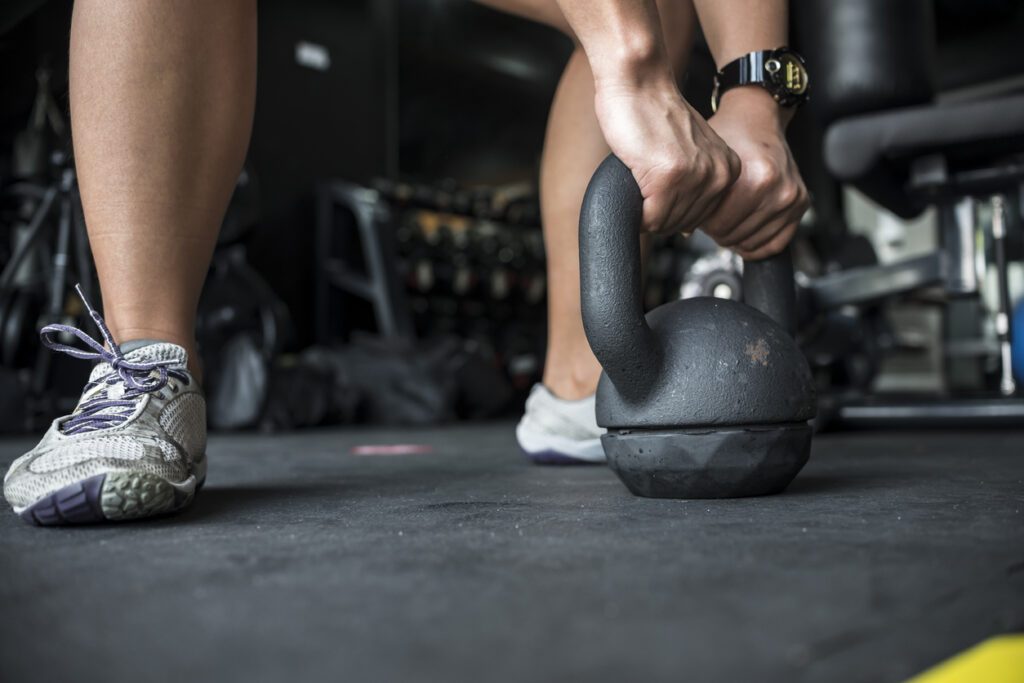
Summary
Welcome / Welcome / Tips for getting started / The benefits of sweating during sport: for better sports practice
The benefits of sweating during sport: for better sports practice
Vous vous demandez pourquoi vous transpirez tant pendant vos séances de sport ? La transpiration, bien plus qu’un simple signe d’effort, est un mécanisme essentiel pour votre corps. Elle régule la température, améliore les performances et favorise le bien-être.
Introduction
In this article, discover how to take full advantage of sweating to boost your workout. What are the real benefits of sweat? How can you optimize this natural process? This article is for you.
Lorsqu’on pense à la transpiration pendant le sport, l’image qui vient souvent en tête est celle d’un effort intense, d’une sueur qui coule à flots et d’un sentiment de malaise lié à l’inconfort. Pourtant, loin d’être un simple désagrément, la transpiration est un mécanisme essentiel pour le corps humain, surtout lors d’une activité physique. Bien qu’elle soit souvent perçue négativement, elle joue un rôle crucial dans la régulation de la température corporelle et le maintien de la performance sportive. Dans cette introduction, découvrons pourquoi la transpiration est une véritable alliée, bien plus qu’un phénomène naturel parfois gênant.
Qu’est-ce que la transpiration et son rôle dans l’organisme
Sweating is a natural physiological process by which the body excretes water, primarily in the form of sweat, through the sweat glands. This mechanism, although often associated with heat or exercise, is actually a complex response of the body to maintain its internal balance, called homeostasis.
When you engage in physical activity, your body generates heat. To prevent overheating, it triggers the production of sweat. This sweat, composed mainly of water and minerals, evaporates on the surface of the skin, which helps cool the body. It is this evaporation process that is the key to thermal regulation during exercise.
Misconceptions about sweating in sport
One of the most common myths is that sweating equals weight loss. In reality, sweat loss is mostly water loss, not fat loss. This weight loss is therefore temporary and will be offset as soon as you rehydrate your body.
Another persistent myth is the idea that sweating is an effective way to eliminate toxins. While sweat does indeed contain trace amounts of some substances, the majority of toxins are eliminated primarily through the liver and kidneys. Sweat plays a minimal role in this process.
In truth, sweating is above all a sophisticated thermal regulation system. It helps maintain a stable body temperature, essential to avoid the risk of overheating, which could harm your performance and put your health at risk.
The essential functions of perspiration during sport
La transpiration, souvent sous-estimée, joue un rôle vital pour tout sportif, qu’il soit amateur ou professionnel. En effet, elle n’est pas qu’un simple signe de l’effort accompli ; elle est un mécanisme clé pour maintenir l’équilibre du corps pendant l’activité physique. Découvrons ensemble ses fonctions essentielles.
Regulation of body temperature
Lors d’un effort physique, votre corps produit de la chaleur. Si cette chaleur n’est pas dissipée, la température corporelle peut augmenter dangereusement. C’est ici que la transpiration entre en jeu. Le processus est simple : lorsque vous transpirez, l’eau s’évapore de votre peau, emportant avec elle de la chaleur. C’est ce refroidissement naturel qui permet de maintenir votre température interne dans une zone de sécurité, assurant ainsi une performance optimale.
Pour que ce processus de thermorégulation soit efficace, l’évaporation de la sueur est essentielle. En effet, si la sueur reste sur la peau sans s’évaporer, par exemple dans des conditions d’humidité élevée, la température du corps pourrait continuer à grimper, entraînant un risque accru de coup de chaleur. Ainsi, l’évaporation n’est pas seulement un confort ; elle est indispensable à la sécurité et à l’efficacité de l’entraînement.
Toxin elimination: myth and reality
Contrairement à une croyance populaire, la transpiration n’élimine qu’une infime quantité de toxines. Les substances réellement éliminées par la sueur sont principalement des électrolytes, comme le sodium et le potassium, ainsi que des traces de métaux lourds et des produits de dégradation métabolique. Cependant, ce n’est qu’une petite part du travail global de détoxification du corps.
The kidneys and liver are the true champions of toxin elimination. Sweat, although it partly participates in this process, is only a secondary player. It can nevertheless help to expel certain excess substances, but it does not replace the main role of other organs. For a healthy body, it is essential to support the work of the kidneys and liver with good hydration and a balanced diet.
Improved blood circulation
When you sweat, your blood vessels dilate to allow better blood flow to the skin, where heat can be released. This process not only improves thermal regulation, but also contributes to better blood circulation. This vascular dilation allows for increased oxygen and nutrient delivery to the muscles, optimizing their function and endurance.
Sweating, by promoting circulation, helps transport oxygen and nutrients more efficiently to active muscles. This results in improved performance and better recovery after exercise. In addition, good circulation helps eliminate metabolic waste more quickly, reducing the risk of post-workout pain and soreness.
Impact of sweating on athletic performance
La transpiration, bien plus qu’un simple phénomène naturel, a un impact direct sur les performances sportives. Elle agit comme un mécanisme essentiel qui, lorsqu’il est bien géré, peut optimiser vos capacités physiques et favoriser une meilleure récupération. Explorons ensemble comment la sueur influence vos performances sur le terrain.
Optimisation de l’endurance
L’endurance est la capacité à maintenir un effort prolongé sans fléchir. Pour les athlètes, la transpiration joue un rôle crucial dans ce domaine. En effet, une bonne régulation thermique via la sueur permet de maintenir une température corporelle stable, évitant ainsi la surchauffe. Cela signifie que votre corps peut continuer à fonctionner efficacement pendant une période plus longue, vous permettant de repousser vos limites. Une sudation insuffisante, en revanche, peut entraîner une élévation rapide de la température corporelle, limitant ainsi votre capacité à poursuivre l’effort.
Improved muscle recovery
Après un effort intense, votre corps accumule des déchets métaboliques, tels que l’acide lactique, qui peuvent provoquer des douleurs et ralentir la récupération. La transpiration contribue à l’élimination de ces déchets en favorisant leur transport hors des cellules musculaires. Bien qu’elle ne soit pas le principal mécanisme d’élimination, la sudation peut accélérer la réduction de ces substances indésirables, facilitant ainsi une récupération plus rapide.
To maximize the benefits of sweating after exercise, it is important to stay well hydrated and adopt techniques that promote light sweating, such as a short stretching session or a warm shower. These practices help to continue to eliminate toxins and relax the muscles, thus reducing muscle soreness and promoting optimal recovery.
Strengthening the immune system
Peu de gens le savent, mais la transpiration joue également un rôle dans le renforcement du système immunitaire. En effet, la sueur contient des peptides antimicrobiens, qui sont des petites protéines capables de neutraliser certains microbes présents sur la peau. Cette fonction protectrice contribue à maintenir une peau saine et à réduire le risque d’infections cutanées, notamment après un entraînement intense où la peau est plus vulnérable.
Psychological benefits of sweating during exercise
La transpiration n’est pas seulement bénéfique pour le corps ; elle a également des impacts positifs sur l’esprit. Lors de l’exercice physique, la sueur est souvent perçue comme le signe visible de l’effort accompli. Cependant, elle joue aussi un rôle clé dans le bien-être mental. Explorons les divers bienfaits psychologiques de la transpiration pendant le sport.
Libération d’endorphines et bien-être
Lorsque vous vous dépensez physiquement, votre corps libère des endorphines, souvent surnommées « hormones du bonheur ». Ces substances chimiques agissent comme des analgésiques naturels, réduisant la perception de la douleur et induisant un sentiment de bien-être. La transpiration, témoin direct de l’effort, est souvent associée à cette libération d’endorphines. Ainsi, plus vous transpirez, plus vous pouvez ressentir cet état de bien-être euphorique, qui explique en partie pourquoi on se sent si bien après une séance de sport intense.
Réduction du stress et de l’anxiété
Transpirer abondamment pendant une activité physique intense permet de libérer non seulement des endorphines, mais aussi de réduire les niveaux de cortisol, l’hormone du stress. Ce processus aide à calmer l’esprit et à réduire les sentiments d’anxiété. En transpirant, vous vous débarrassez non seulement de l’excès de chaleur, mais aussi du stress accumulé, ce qui peut avoir un effet profondément relaxant. Comparé à d’autres techniques de gestion du stress comme la méditation, le sport et la transpiration qui l’accompagnent offrent une approche plus active et énergisante pour retrouver votre sérénité.
Amélioration de l’estime de soi et de l’image corporelle
La transpiration peut également avoir un impact positif sur l’estime de soi. Lorsque vous voyez les gouttes de sueur couler, c’est une preuve tangible de votre engagement et de votre détermination. Cela peut renforcer votre sentiment d’accomplissement et vous encourager à poursuivre vos objectifs de fitness. En outre, cette perception positive de l’effort physique contribue à une meilleure image corporelle. Se voir transpirer peut devenir un symbole de force et de persévérance, vous aidant à développer une relation plus saine avec votre corps.
How to maximize the benefits of sweating during exercise
Sweating while exercising is beneficial, but to get the most out of it, it is essential to know how to optimize this natural process. By taking certain precautions and adopting specific practices, you can maximize the positive effects of sweating on your body and mind. Let's see how to do it together.
Hydratation adéquate : la clé d’une transpiration efficace
L’hydratation est primordiale pour que la transpiration soit bénéfique. Avant de commencer votre entraînement, assurez-vous de boire suffisamment d’eau pour préparer votre corps à l’effort. Pendant l’activité, continuez à boire régulièrement pour compenser la perte de liquide due à la transpiration. Et après l’effort, hydratez-vous pour rétablir l’équilibre hydrique et faciliter la récupération. Une bonne hydratation permet non seulement de transpirer efficacement, mais aussi d’éviter la déshydratation, qui pourrait nuire à votre performance et à votre santé.
La quantité d’eau à consommer dépend de l’intensité de votre entraînement. Pour une séance modérée, environ 500 ml d’eau une à deux heures avant l’effort sont suffisants. Pendant l’entraînement, il est conseillé de boire 150 à 300 ml toutes les 20 minutes, en fonction de la chaleur et de la durée de l’exercice. Après l’effort, boire environ 500 ml pour chaque demi-kilo de poids perdu pendant l’activité permet de compenser les pertes. En respectant ces recommandations, vous maintiendrez une transpiration efficace et bénéfique.
For high intensity workouts like HIIT, il peut être utile d’opter pour des boissons isotoniques, qui contiennent non seulement de l’eau, mais aussi des électrolytes et des glucides. Ces boissons aident à reconstituer les réserves de sels minéraux perdus avec la sueur, tout en fournissant de l’énergie rapide pour soutenir l’effort. Cependant, pour des séances plus courtes ou moins intenses, l’eau reste la meilleure option.
Choosing the right clothing for better evaporation
Le choix des vêtements est crucial pour maximiser les bienfaits de la transpiration. Optez pour des vêtements fabriqués à partir de matériaux techniques, comme le polyester ou les tissus synthétiques conçus pour évacuer l’humidité. Ces matériaux permettent à la sueur de s’évaporer plus facilement, ce qui aide à réguler la température corporelle et à éviter l’accumulation de chaleur.
Évitez les vêtements en coton, qui retiennent l’humidité et empêchent une bonne évaporation de la sueur. De même, les vêtements trop serrés peuvent entraver la circulation de l’air et piéger la chaleur, rendant la transpiration moins efficace. Préférez des tenues légères et respirantes qui vous permettent de bouger librement tout en favorisant une évaporation optimale.
Adaptation de l’intensité de l’entraînement pour stimuler la sudation
Pour optimiser votre transpiration, il est important d’adapter l’intensité de votre entraînement progressivement. En augmentant progressivement l’intensité de vos séances, votre corps s’habitue à transpirer plus efficacement. Cette progressivité permet de stimuler la sudation de manière naturelle, tout en évitant les risques de déshydratation ou d’épuisement.
Précautions et points d’attention
Although sweating is a natural and beneficial mechanism for the body, it requires certain precautions to avoid adverse effects. It is important to understand the risks associated with excessive sweating, the necessary skin care, as well as the situations that may require medical attention. Here is what you need to know to sweat safely.
Risks of excessive sweating
L’un des principaux risques d’une transpiration excessive est la déshydratation. Lorsque vous perdez trop d’eau par la sueur sans compenser par une hydratation adéquate, votre corps peut rapidement se déshydrater. La déshydratation entraîne une diminution des performances sportives, une augmentation de la fatigue et, dans les cas extrêmes, des complications graves comme les coups de chaleur. Pour éviter cela, veillez à boire régulièrement de l’eau avant, pendant et après l’effort, et surveillez les signes de déshydratation tels que la bouche sèche, la fatigue ou les étourdissements.
With sweat, you also lose essential electrolytes, such as sodium, potassium, and magnesium. Excessive loss of these minerals can cause muscle cramps, weakness, and electrolyte imbalances. To prevent these effects, you can incorporate isotonic drinks during intense workouts, especially in hot and humid conditions, to effectively replace lost electrolytes.
Hygiene and skin care for sweaty athletes
Après une séance de sport où vous avez beaucoup transpiré, il est essentiel de prendre une douche rapidement. La sueur laissée sur la peau peut obstruer les pores, favorisant l’apparition de boutons et d’irritations. De plus, les bactéries présentes sur la peau peuvent se multiplier dans un environnement humide, augmentant le risque d’infections cutanées. Utiliser un savon doux et de l’eau tiède aide à éliminer les impuretés et à maintenir la peau propre et saine.
Excessive sweating, especially when trapped in tight or non-breathable clothing, can cause irritation and chafing, especially in sensitive areas such as the armpits, groin and feet. To avoid this, wear clothing made of technical materials that wick away moisture, and remember to change your clothes promptly after exercise. Applying antifungal powders or soothing creams can also prevent fungal infections and soothe skin irritations.
Special cases requiring medical attention
Hyperhidrosis is a medical condition where sweating is excessive and occurs even in the absence of physical exertion or heat. If you find yourself sweating profusely for no apparent reason, it is advisable to consult a doctor. Hyperhidrosis can be a sign of an underlying problem and may require specific treatments to be controlled.
On the other hand, anhidrosis is a condition where the body does not sweat enough, which can be dangerous because it prevents the body from cooling itself effectively. If you notice a lack of sweating despite intense exercise or high temperatures, it is crucial to consult a healthcare professional. Anhidrosis can be linked to nerve problems or hormonal imbalances and requires medical attention.
It is recommended to consult a sports doctor if you notice abnormalities in your sweating, such as excessive or insufficient sweating, or if you develop persistent skin irritations despite good hygiene. Medical monitoring is also recommended if you practice intense physical activities regularly, in order to prevent electrolyte imbalances and optimize your recovery.
Conclusion
Sweating is an essential mechanism for the body, especially during exercise. It regulates body temperature, improves performance and contributes to your mental well-being. By adopting good practices, you will optimize its benefits while avoiding risks.
To take full advantage of these benefits, it is crucial to stay hydrated, choose the right clothes and respect your body's signals. Paying special attention to hygiene also helps prevent skin problems.
Come sweat with DRIP
Ready to step up your training? Check out DRIP! With our diverse gear, you'll be comfortable while pushing yourself.
Chez DRIP, c’est simple : du bootcamp inédit avec 7 exercices, 3 tours, 1 minute par exercice. Enchaînez sans répit pour brûler un maximum de calories ! Nos coachs, nos playlists énergiques et nos lumières immersives vous donneront une motivation sans pareille.
Whatever your level, DRIP welcomes you with open arms!
Pour transpirer encore plus, on propose des cours DRIP x HYROX pour vous préparer à cette course impitoyable.
Want to sweat? Join us in our Parisian studios in Monceau or Grands Boulevards. You'll love the challenge! ❤️🔥
Share
Tagged
Read also
follow us
on instagram
To follow all our news,
take advantage of our tutorials and participate
in our many competitions.
BREAKING NEWS!
Receive our newsletter.






